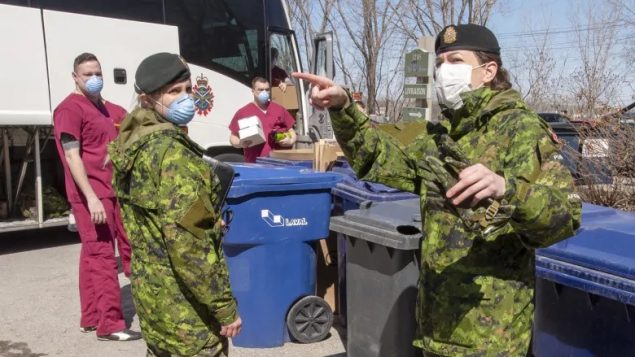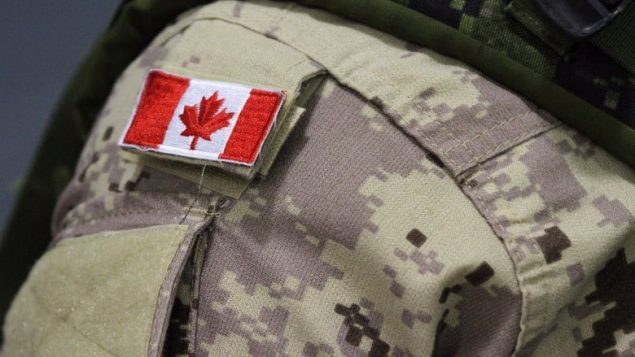The Canadian military is being deployed to the Canada-U.S. border to help set up COVID-19 test centres that the Public Health Agency of Canada (PHAC) is currently creating at 16 border crossings.
The military assistance includes sending some service members to different sites to help with planning and logistics.
“In co-ordination with PHAC and Public Safety, CAF planners from regional joint task forces are assisting in the assessment of options, in some cases through on-the-ground assistance in reconnaissance, related to planning and logistics,” Jessica Lamirande, a Department of Defence spokesperson, told The Canadian Press news agency in an email.

Military personnel are seen arriving at a seniors residence in Laval, Que. on April 20. Forces will now be helping out at the Canada-U.S. border, where testing sites are currently being created. (THE CANADIAN PRESS/Ryan Remiorz)
Mary-Liz Power, a spokesperson for Public Safety Minister Bill Blair, told CP that the military “is not currently planned to undertake any role related to testing, quarantine, or enforcement at the border.”
The government announced plans for the new border controls last month, but provided few specifics.
Last Friday, Prime Minister Justin Trudeau announced that–as of Feb. 22, this coming Monday–non-essential travellers will be required to take a COVID-19 molecular test when they arrive at the Canada-U.S. border, or they will not be allowed to enter Canada.
They will also still be required to quarantine for 14 days, after which they will be tested again.
Essential workers such as truck drivers and emergency service providers, who account for about 93 per cent of travellers crossing the border, will be exempted from the quarantine.

Canada Customs between St. Stephen, N.B, and Calais, Maine. There are no lineups coming into Canada these days. (iStock)
Other possible exemptions will be assessed on a case-by-case basis.
Trudeau also said that–beginning yesterday, Feb.15–people arriving in Canada by land borders would be required to show a negative COVID-19 test taken within 72 hours of arrival.
Those restrictions get tighter next Monday.
As well–as of next Monday–travellers arriving to Canada by air–with some exceptions–will be required to take a COVID-19 molecular test before they exit the airport.
They will also be required to quarantine for three days at a government-approved hotel at their own expense until they get a result.
If the person tests negative for the virus, they will be allowed to go home but must then quarantine for two weeks under increased surveillance.
They will also be required to take another test at the end of their 14-day quarantine period.

As of next Monday, people crossing into Canada by land will have to take a COVID-19 test at the border, as well as at the the end of a 14-day quarantine. (iStock)
If a person tests positive, they must quarantine at a designated government facility to make sure they are not carrying any variants of concern.
The border deployment is not the first time the military has been called in to face the COVID-19 pandemic.
Last year, it provided assistance at 54 long-term care facilities in Ontario and Quebec.
With files from The Canadian Press (Lee Berthiaume), CBC News, RCI







For reasons beyond our control, and for an undetermined period of time, our comment section is now closed. However, our social networks remain open to your contributions.